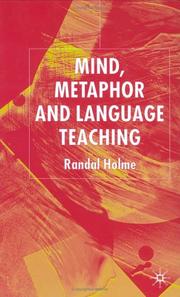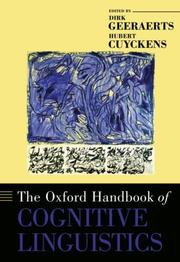| Listing 1 - 10 of 27 | << page >> |
Sort by
|
Book
ISBN: 9781441141637 9781474295000 1474295002 1441141634 9781441160775 1441160779 9781472527042 1472527046 1472593634 1322307458 Year: 2014 Publisher: London Bloomsbury
Abstract | Keywords | Export | Availability | Bookmark
 Loading...
Loading...Choose an application
- Reference Manager
- EndNote
- RefWorks (Direct export to RefWorks)
#KVHA:Taalkunde --- #KVHA:Discourse analysis --- #KVHA:Cognitieve grammatica --- Critical discourse analysis. --- Cognitive grammar. --- Discoursanalyse.

ISBN: 9781403915856 1403915857 Year: 2004 Publisher: Basingstoke Palgrave Macmillan
Abstract | Keywords | Export | Availability | Bookmark
 Loading...
Loading...Choose an application
- Reference Manager
- EndNote
- RefWorks (Direct export to RefWorks)
Lexicology. Semantics --- Psycholinguistics --- Didactics of languages --- Metaphor. --- Language and languages --- Cognitive grammar. --- Language acquisition. --- Study and teaching. --- #KVHA:Taalonderwijs --- Cognitieve grammatica --- Metaforen --- Taal en talen --- didactiek --- Cognitieve grammatica. --- Metaforen. --- didactiek. --- Didactiek. --- Language and languages - Study and teaching.
Book
ISBN: 847635620X 9788476356203 Year: 2005 Publisher: Madrid Arco/Libros
Abstract | Keywords | Export | Availability | Bookmark
 Loading...
Loading...Choose an application
- Reference Manager
- EndNote
- RefWorks (Direct export to RefWorks)
Spanish language --- Grammar --- Study and Teaching --- Cognitieve grammatica --- Spaans als tweede taal --- Spaanse taal --- grammatica --- didactiek --- Cognitieve grammatica. --- Spaans als tweede taal. --- didactiek. --- Grammatica --- Didactiek. --- Spanish language - Grammar - Study and Teaching --- Spanish language - Grammar
Book
ISBN: 9783110208474 3110208474 1283398818 3110223872 9786613398819 Year: 2010 Publisher: Berlin de Gruyter
Abstract | Keywords | Export | Availability | Bookmark
 Loading...
Loading...Choose an application
- Reference Manager
- EndNote
- RefWorks (Direct export to RefWorks)
Langue allemande --- --Grammaire --- --#KVHA:Taalkunde --- #KVHA:Cognitieve grammatica --- #KVHA:Functionele grammatica --- #KVHA:Constructiegrammatica --- #KVHA:Taalkunde --- --Langue allemande --- Grammaire

ISBN: 9781845531096 1845531094 9781845531102 1845531108 Year: 2007 Publisher: London Equinox
Abstract | Keywords | Export | Availability | Bookmark
 Loading...
Loading...Choose an application
- Reference Manager
- EndNote
- RefWorks (Direct export to RefWorks)

ISBN: 9780195331967 9780195331950 0195331966 Year: 2008 Publisher: Oxford Oxford University Press
Abstract | Keywords | Export | Availability | Bookmark
 Loading...
Loading...Choose an application
- Reference Manager
- EndNote
- RefWorks (Direct export to RefWorks)
This book fills a long standing need for a basic introduction to Cognitive Grammar that is current, authoritative, comprehensive, and approachable. It presents a synthesis that draws together and refines the descriptive and theoretical notions developed in this framework over the course of three decades. In a unified manner, it accomodates both the conceptual and the social-interactive basis of linguistic structure, as well as the need for both functional explanation and explicit structural description. Starting with the fundamentals, essential aspects of the theory are systematically laid out with concrete illustrations and careful discussion of their rationale. Among the topics surveyed are conceptual semantics, grammatical classes, grammatical constructions, the lexicon-grammar continuum characterized as assemblies of symbolic structures (form-meaning pairings), and the usage- based account of productivity, restrictions, and well-formedness. The theory's central claim - that grammar is inherently meaningful - is thereby shown to be viable. The framework is further elucidated through application to nominal structure, clause structure, and complex sentences. These are examined in broad perspective, with exemplification from English and numerous other languages. In line with the theory's general principles, they are discussed not only in termsof their structural characterization, but also their conceptual value and functional motivation. Other matters explored include discourse, the temporal dimension of language structure, and what grammar reveals about cognitive processes and the contruction of our mental world.
Psycholinguistics --- Grammar --- Cognitive grammar --- #KVHA:Taalkunde --- #KVHA:Cognitieve grammatica --- 801.56 --- Syntaxis. Semantiek --- Cognitive grammar. --- 801.56 Syntaxis. Semantiek --- Cognitive linguistics --- Grammar, Comparative and general

ISBN: 9780199738632 9780195143782 0195143787 Year: 2007 Publisher: Oxford Oxford University Press
Abstract | Keywords | Export | Availability | Bookmark
 Loading...
Loading...Choose an application
- Reference Manager
- EndNote
- RefWorks (Direct export to RefWorks)
In the past decade, Cognitive Linguistics has developed into one of the most dynamic and attractive frameworks within theoretical and descriptive linguistics The Oxford Handbook of Cognitive Linguistics is a major new reference that presents a comprehensive overview of the main theoretical concepts and descriptive/theoretical models of Cognitive Linguistics, and covers its various subfields, theoretical as well as applied. The first twenty chapters give readers the opportunity to acquire a thorough knowledge of the fundamental analytic concepts and descriptive models of Cognitive Linguistics and their background. The book starts with a set of chapters discussing different conceptual phenomena that are recognized as key concepts in Cognitive Linguistics: prototypicality, metaphor, metonymy, embodiment, perspectivization, mental spaces, etc. A second set of chapters deals with Cognitive Grammar, Construction Grammar, and Word Grammar, which, each in their own way, bring together the basic concepts into a particular theory of grammar and a specific model for the description of grammatical phenomena. Special attention is given to the interrelation between Cognitive and Construction Grammar. A third set of chapters compares Cognitive Linguistics with other forms of linguistic research (functional linguistics, autonomous linguistics, and the history of linguistics), thus giving a readers a better grip on the position of Cognitive Linguistics within the landscape of linguistics at large. The remaining chapters apply these basic notions to various more specific linguistic domains, illustrating how Cognitive Linguistics deals with the traditional linguistic subdomains (phonology, morphology, lexicon, syntax, text and discourse), and demonstrating how it handles linguistic variation and change. Finally they consider its importance in the domain of Applied Linguistics, and look at interdisciplinary links with research fields such as philosophy and psychology. With a well-kn
801.56 --- 801.56 Syntaxis. Semantiek --- Syntaxis. Semantiek --- #KVHA:Cognitieve grammatica --- Cognitive grammar --- Academic collection --- #KVHA:Taalkunde --- Cognitive linguistics --- Grammar, Comparative and general --- Psycholinguistics --- Cognitive grammar. --- Grammaire cognitive
Book
ISBN: 9780199234660 0199234663 9780199234677 0199234671 1282730665 9786612730665 0191571156 0191715492 Year: 2009 Publisher: Oxford Oxford University Press
Abstract | Keywords | Export | Availability | Bookmark
 Loading...
Loading...Choose an application
- Reference Manager
- EndNote
- RefWorks (Direct export to RefWorks)
How Words Mean introduces a new approach to the role of words and other linguistic units in the construction of meaning. It does so by addressing the interaction between non-linguistic concepts and the meanings encoded in language. It develops an account of how words are understood when we produce and hear language in situated contexts of use. It proposes two theoretical constructs, the lexical concept and the cognitive model. These are central to the accounts of lexicalrepresentation and meaning construction developed, giving rise to the Theory of Lexical Concepts and Cognitive Models (or LCC
Lexicology. Semantics --- Cognitive grammar. --- Semantics. --- Cognitieve grammatica --- Semantiek --- 801.56 --- Syntaxis. Semantiek --- 801.56 Syntaxis. Semantiek --- Cognitieve grammatica. --- Semantiek. --- Cognitive grammar --- Semantics --- Formal semantics --- Semasiology --- Semiology (Semantics) --- Comparative linguistics --- Information theory --- Language and languages --- Lexicology --- Meaning (Psychology) --- Cognitive linguistics --- Grammar, Comparative and general --- Psycholinguistics

ISBN: 1575862204 1575862190 Year: 2000 Publisher: Stanford, Calif. Center for the Study of Language and Information
Abstract | Keywords | Export | Availability | Bookmark
 Loading...
Loading...Choose an application
- Reference Manager
- EndNote
- RefWorks (Direct export to RefWorks)
Linguistic analysis (Linguistics). --- Linguistic models. --- Cognitieve grammatica --- Gebruiksgerichte taalwetenschap --- Linguïstische analyse --- Linguïstische modellen --- Cognitieve grammatica. --- Gebruiksgerichte taalwetenschap. --- Linguïstische analyse. --- Linguïstische modellen. --- 801.56 --- 801.56 Syntaxis. Semantiek --- Syntaxis. Semantiek --- Linguistic analysis (Linguistics) --- Linguistic models --- Models, Linguistic --- Linguistics --- Typology (Linguistics) --- Analysis, Linguistic (Linguistics) --- Analysis (Philosophy) --- Grammar, Comparative and general --- Pragmatics
Book
ISBN: 9783110214345 3110214342 9783110214352 3110214350 3111736423 1282296523 9786612296529 3110214369 9783110214369 9781282296527 6612296526 Year: 2009 Volume: 42 Publisher: Berlin Mouton de Gruyter
Abstract | Keywords | Export | Availability | Bookmark
 Loading...
Loading...Choose an application
- Reference Manager
- EndNote
- RefWorks (Direct export to RefWorks)
This volume makes accessible a substantial range of recent research in Cognitive Grammar. From disparate sources, it brings together a dozen innovative papers, revised and integrated to form a coherent whole. This work continues the ongoing program of progressively articulating the theoretical framework and showing its descriptive application to varied grammatical phenomena. A number of major topics are examined in depth through multiple chapters viewing them from different perspectives: grammatical constructions (their general nature, their metonymic basis, their role in grammaticization), nominal grounding (quantifiers, possessives, impersonal it), clausal grounding (its relation to nominal grounding, an epistemic account of tense, a systemic view of the English auxiliary), the "control cycle" (an abstract cognitive model with many linguistic manifestations), finite clauses (their internal structure and external grammar), and complex sentences (complementation, subordination, coordination). In each case the presentation builds from fundamentals and introduces the background needed for comprehension. At the same time, by bringing fresh approaches and new descriptive insights to classic problems, it represents a significant advance in understanding grammar and indicates future directions of theory and research in the Cognitive Grammar framework. The book is of great interest to students and practitioners of cognitive linguistics and to scholars in related areas.
Psycholinguistics --- Grammar --- Cognitive grammar --- Cognitive grammar. --- Philology & Linguistics --- Languages & Literatures --- 801.56 --- #KVHA:Taalkunde --- #KVHA:Cognitieve grammatica --- Syntaxis. Semantiek --- 801.56 Syntaxis. Semantiek --- Cognitive linguistics --- Grammar, Comparative and general --- Cognitive Grammar. --- Semantics. --- Syntax.
| Listing 1 - 10 of 27 | << page >> |
Sort by
|

 Search
Search Feedback
Feedback About UniCat
About UniCat  Help
Help News
News